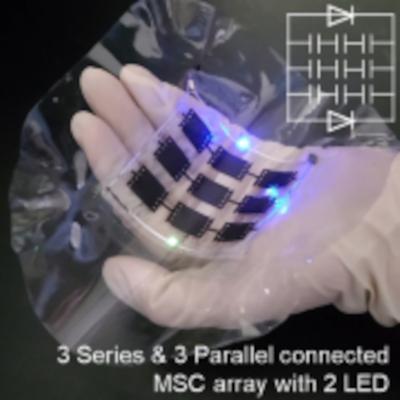Researchers from Pohang University of Science and Technology (POSTECH), Korea Institute of Industrial Technology and Konkuk University have reported the development of a small-scale energy storage device capable of stretching, twisting, folding, and wrinkling.
Nine MSC units connected in three parallel and three series. Image from npj Flexible Electronics
Micro supercapacitors (MSCs) have emerged as a promising candidate for deformable energy storage, due to high-power density, rapid charging, and long cycle life. However, the fabrication of interdigitated electrode patterns capable of maintaining the energy storage performance under repeated stretching and twisting has remained a great challenge, because brittle materials like gold (Au) have been commonly used as an electrode.
Eutectic gallium-indium liquid metal (EGaIn) has high conductivity and deformability, but fine patterning it EGaIn has proven extremely difficult due to very high surface tension of EGaIn.
The research team successfully fabricated fine patterning, by using laser, of both EGaIn and graphene (serving as an active material) layers as on a stretchable polystyrene-block-poly(ethylene-co-butylene)-block-polystyrene copolymer (SEBS) substrate.
During laser ablation of EGaIn and graphene layers, the underlying stretchable SEBS substrate was not damaged, which maintained the flexibility of MSC device.
The areal capacitance of the resulting MSC retains its original value even after stretching up to 1,000 cycles.
Also, the fabricated MSCs operate stably under various mechanical deformations, including stretching, folding, twisting, and wrinkling (see the attached images).
Professor Jin Kon Kim of POSTECH remarked, "the use of laser-patterned liquid metal electrodes represents a significant step forward in the development of truly deformable energy storage solutions. As wearable technologies continue to advance, innovations like these will play a vital role in ensuring that our devices can adapt to the demands of our dynamic lifestyles."


